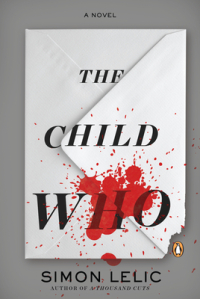The Child Who by Simon Lelic
 Wednesday, March 7, 2012 at 5:19PM
Wednesday, March 7, 2012 at 5:19PM 
Published by Penguin on February 28, 2012
Leo Curtice -- the solicitor representing Daniel Blake, a twelve-year-old boy accused of brutally murdering Felicity Forbes, an eleven-year-old girl -- has the biggest case of his career. His fifteen-year-old daughter, Ellie, doesn't want her father to take the case, but after spending his career "mopping up the spillage" from tavern brawls, Leo wants a meatier challenge, a high profile client. He isn't prepared for the public's reaction: a mob nearly overturns his van, students throw red ink on his daughter's coat, a supermarket shopper spits on his wife. To the small-minded residents of Exeter, an accusation is proof of guilt, a lawyer is just as guilty as his client, and the lawyer's family merits the same condemnation as the accused.
The head teacher at one of the many schools Daniel attended insists that Daniel was born bad. Yet Daniel's stepfather is no model of self-restraint. To mitigate Daniel's punishment, Leo knows that Daniel needs to talk to a psychologist who can get to the bottom of Daniel's antisocial behavior. Daniel's stepfather steadfastly resists that suggestion, leaving the reader to wonder what the stepfather is trying to hide. The answer is surprising.
Leo observes that the media would have children like Daniel "breaking boulders, even before they had been convicted of a crime." Never mind that he's twelve. Never mind his horrible childhood. He committed a crime and the eye-for-an-eye crowd demands retribution. Their attitude echoes John Major: "We need to condemn a little more and understand a little less" -- as if understanding why people act as they do is a bad thing.
Simon Lelic does a remarkable job of getting inside the young boy's head and of conveying society's unthinking hatred of him. Reading The Child Who is an intense experience. Readers who are open to looking beyond a horrible crime and understanding a child's motivation for committing it will appreciate this novel. Those who agree with John Major will probably want to pass it by. The novel's message -- expressly stated at one point as "hate trumps humanity" -- will not appeal to every reader, but for those who are prepared to see the world in more complex terms than the "good versus evil" text of a morality play, The Child Who has much to offer.
There are really two stories here: Daniel's and Leo's. To some extent, Leo's story is a familiar one: A lawyer's family can't understand why the lawyer is defending an obviously guilty client at the expense of his own family's welfare. Yet Simon Lelic's novel is more than a rehash of a tired story. His sensitive exploration of a family dynamic is both powerful and insightful, and about two-thirds of the way through the plot takes a sharp turn, before maneuvering in yet another direction at the end. The new developments could have been maudlin but Lelic made smart decisions, omitting scenes that probably can't be written in an original way, jumping forward to explore the consequences of dramatic events, then backtracking, filling in the gaps with just enough information to maintain tension and the reader's empathy.
Lelic writes in a simple style to maintain a brisk pace but The Child Who is anything but a simple novel. It tackles complex and enduring questions that are routinely ignored by the talking heads who would rather sensationalize crime than help their audience understand it. It focuses on all the people whose lives are touched by crime, not just the immediate victims. This is a rich and rewarding novel.
RECOMMENDED
 TChris |
TChris |  Post a Comment |
Post a Comment |  Recent Release,
Recent Release,  Simon Lelic in
Simon Lelic in  Thriller
Thriller